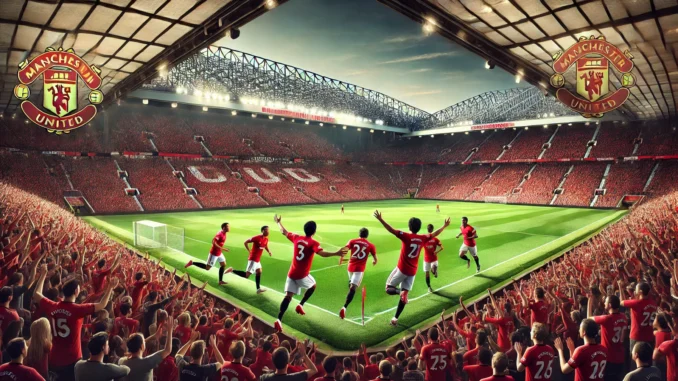
Introduction
Manchester United, often called Man United or The Red Devils, is one of the most famous and successful football clubs worldwide. Based in Manchester, England, the club boasts a legacy of thrilling victories, legendary players, and a passionate global fanbase. With a rich history of domestic and international success, Manchester United remains a symbol of excellence in world football.
History and Early Years
Founded in 1878 as Newton Heath LYR Football Club, Manchester United officially adopted its current name in 1902. The club won its first English League title in 1908, establishing itself as a dominant force in English football.
Despite early financial struggles, the club’s resilience and ambition paved the way for future success and laid the foundation for becoming a global football powerhouse.
Key Early Milestones
| Year | Event |
|---|---|
| 1878 | Founded as Newton Heath LYR Football Club. |
| 1902 | Renamed Manchester United. |
| 1908 | Won first English League title. |
| 1910 | Moved to Old Trafford stadium. |
| 1948 | Won the FA Cup for the first time. |
The Busby Era and the 1958 Tragedy
In the 1950s, under Sir Matt Busby, Manchester United transformed into a footballing powerhouse. The “Busby Babes”, a team of young and talented players, captivated fans with their attacking style.
However, tragedy struck on February 6, 1958, when the Munich air disaster claimed the lives of eight players. Despite this heartbreaking loss, the club recovered and rebuilt, eventually becoming a symbol of resilience and determination.
The Busby Era Timeline
| Year | Event |
|---|---|
| 1945 | Sir Matt Busby becomes Manchester United manager. |
| 1956 | Won first post-war League title. |
| 1958 | Munich air disaster kills eight players. |
| 1963 | Won FA Cup after rebuilding the team. |
| 1968 | Became the first English club to win the European Cup. |
Golden Era of the 1990s and 2000s
Manchester United’s most glorious era began under Sir Alex Ferguson, who managed the club from 1986 to 2013. With a focus on youth development, tactical innovation, and a winning mentality, Ferguson led United to unprecedented success.
The 1998-99 season was especially historic as United won the treble—the Premier League, FA Cup, and UEFA Champions League.
Key Achievements Under Sir Alex Ferguson
| Year | Major Achievement |
|---|---|
| 1992-93 | Won the first Premier League title. |
| 1998-99 | Treble: Premier League, FA Cup, Champions League. |
| 2007-08 | Won the Premier League and UEFA Champions League. |
| 2012-13 | Won 20th English League title (Ferguson’s final season). |
Iconic Players of the Ferguson Era
| Player | Position | Notable Contribution |
|---|---|---|
| Eric Cantona | Forward | Inspired the 1990s dominance. |
| Ryan Giggs | Midfielder | Most appearances in club history. |
| David Beckham | Midfielder | Famous for free kicks and global fame. |
| Paul Scholes | Midfielder | Known for vision and goal-scoring. |
| Cristiano Ronaldo | Forward | Helped win the 2008 Champions League. |
Modern Success and Challenges
Since Ferguson’s retirement in 2013, Manchester United has faced ups and downs while trying to maintain their elite status. Despite managerial changes and fierce competition, the club has continued to win domestic and European trophies.
Stars like Bruno Fernandes and Marcus Rashford are leading the club’s revival efforts as they aim to return to the top.
Recent Achievements
| Year | Title |
|---|---|
| 2016 | FA Cup under Louis van Gaal. |
| 2017 | Europa League under José Mourinho. |
| 2023 | Carabao Cup under Erik ten Hag. |
Home Stadium and Fans
Manchester United plays at Old Trafford, famously known as “The Theatre of Dreams.” It is one of the most iconic football venues in the world, with a capacity of over 74,000.
The club boasts a global fanbase with official supporter groups in over 100 countries, making Manchester United a worldwide football phenomenon.
Old Trafford Facts
| Feature | Details |
|---|---|
| Location | Manchester, England |
| Capacity | 74,310 |
| Opened | 1910 |
| Nickname | The Theatre of Dreams |
| Notable Event | Hosted 1966 World Cup matches. |
Youth Academy and Social Work
Manchester United’s youth academy is known for producing generational talents who have shaped the club’s success. The famous Class of ’92, which included players like David Beckham and Ryan Giggs, remains a model for youth development.
Through the Manchester United Foundation, the club also supports education, youth engagement, and community projects.
Notable Academy Graduates
| Player | Years Active | Legacy |
|---|---|---|
| George Best | 1963-1974 | One of football’s greatest talents. |
| Ryan Giggs | 1990-2014 | Most appearances in club history. |
| David Beckham | 1992-2003 | Global football icon. |
| Marcus Rashford | 2016-present | Star forward and social advocate. |
Rivalries and Legacy
Manchester United’s fiercest rivalry is with Manchester City, and their encounters, known as the Manchester Derby, are among the most anticipated matches worldwide. The club also shares intense rivalries with Liverpool and Arsenal.
The legacy of Manchester United is defined by resilience, excellence, and an enduring commitment to success.
Major Rivalries
| Rival Club | Rivalry Name | Key Matches |
|---|---|---|
| Manchester City | Manchester Derby | Intense local rivalry. |
| Liverpool | Northwest Derby | Battle for English football supremacy. |
| Arsenal | Ferguson-Wenger Era | Heated clashes during the 2000s. |
Conclusion
From humble beginnings to becoming a global football powerhouse, Manchester United embodies the spirit of passion, resilience, and excellence. With a storied past and a promising future, the club continues to inspire millions worldwide.
As The Red Devils pursue new heights, their legacy remains one of the most remarkable and influential in the history of football.
Leave a Reply